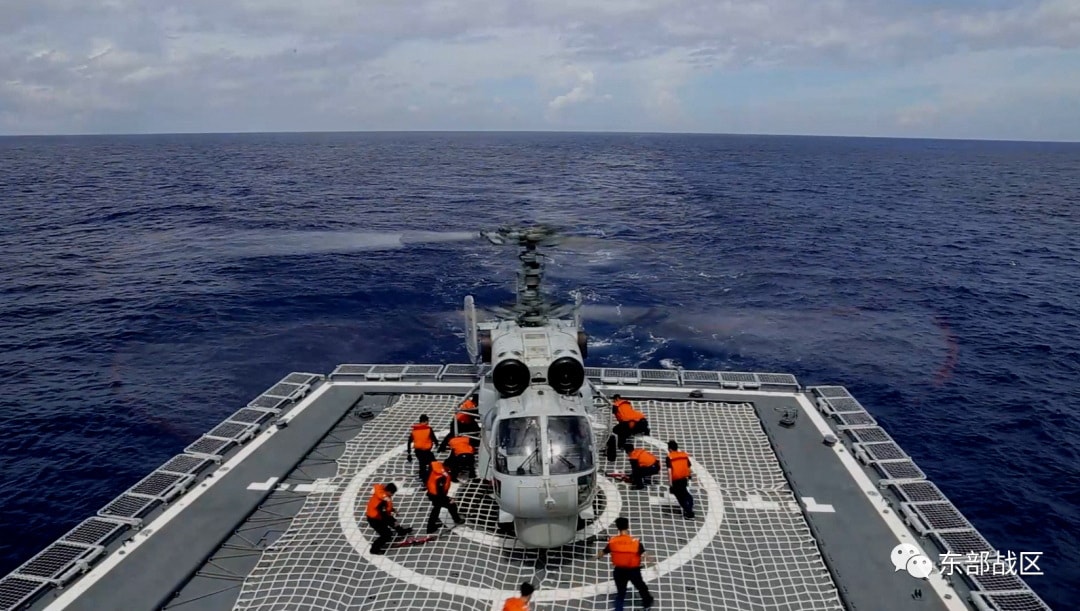“China has used the drills in its military playbook to prepare for invasion of Taiwan,” Wu said, citing Beijing’s exercises, missile launches, cyberattacks and trade sanctions as “an attempt to weaken public morale in Taiwan.”
“China has threatened Taiwan militarily for years, and it continues to upgrade its efforts,” he said. “This is a fact.”
Tensions in the Taiwan Strait have been soaring in recent days, raising fears of a possible conflict that could involve China, the United States and Taiwan, as well as Washington’s allies in the region.
The Eastern Theater Command of the People’s Liberation Army (PLA) said Tuesday that sea and air drills near Taiwan were continuing, marking at least the sixth consecutive day of exercises intended to menace the island. It said the maneuvers would focus on simulating blockades and joint logistics coordination. Taiwan’s military began previously scheduled exercises on Tuesday.
“The [Chinese Communist Party’s] continued military exercises show that the threat of force has not been reduced,” Taiwan’s Defense Ministry said Tuesday.
Beijing claims that Taiwan, a self-governed democracy that has enjoyed de facto independence for decades, is an inseparable part of its territory that must be unified with China. In retaliation for Taiwan’s hosting of Pelosi (D-Calif.) last week, the PLA announced military exercises targeting Taiwan from all directions.
The PLA subsequently fired missiles around Taiwan and sent dozens of military aircraft and warships near the island. It has deployed warships and jets across the midpoint of the Taiwan Strait, the unofficial median line that both sides had largely respected for years until 2020, when Beijing denied the existence of the median line and began crossing it more frequently.
Within China, state media and officials have worked to project strength to citizens who have for decades been taught that Taiwan is rightfully theirs and will one day be part of the Chinese motherland. Military analysts speaking to state media say military incursions across the median line will happen more regularly, with some arguing that Pelosi’s visit could “speed up” unification.
State broadcaster China Central Television (CCTV) published a video clip Tuesday of the PLA practicing an amphibious assault on the shores of Fujian, the province directly across from Taiwan.
At a regular media briefing in Beijing, Wang Wenbin, a spokesman for China’s Foreign Ministry, did not answer a question on how long the exercises would last. He said the government was conducting “normal military exercises” in an “open, transparent and professional” manner, in line with domestic and international law.
The drills “are a warning to provocateurs,” he said, describing China’s response as “justified” to protect China’s territorial integrity.
While tensions are at their highest since the last Taiwan Strait crisis in the 1990s, when the PLA fired missiles that landed close to Taiwan, the prospect of military confrontation is still low.
Beijing has signaled some restraint and a desire to avoid direct conflict with the United States. Plans for the drills — scheduled for after Pelosi’s departure — covered areas within the 12-nautical-mile littoral zone that Taiwan claims as its territorial waters. But Taiwan’s Defense Ministry said Monday that no Chinese military aircraft had yet encroached on the island’s territory.
The drills have had little impact on daily life in Taiwan, where residents are used to near-daily reports of Chinese military incursions. Taiwan’s Defense Ministry said it detected 10 PLA warships and 45 warplanes, including 16 that crossed the median line on Tuesday.
A poll released Monday by the Chinese Association for Public Opinion Research, a group in Taiwan, found that more than 60 percent of about 1,000 respondents surveyed between Aug. 3 and 5 were not worried that cross-strait tensions would lead to military conflict. About 54 percent said they believed that Pelosi’s visit was good for US-Taiwan ties.
Asked whether there was real worry in the Taiwanese government that Beijing is preparing for an invasion, Wu said his country was “very concerned.”
“But at the same time, we stay calm,” he said. “We stay resilient. The best way to deal with a regime which is trying to intimidate us is to show that we are not intimidated. We are not scared by China.”
Pei-Lin Wu contributed to this report.
